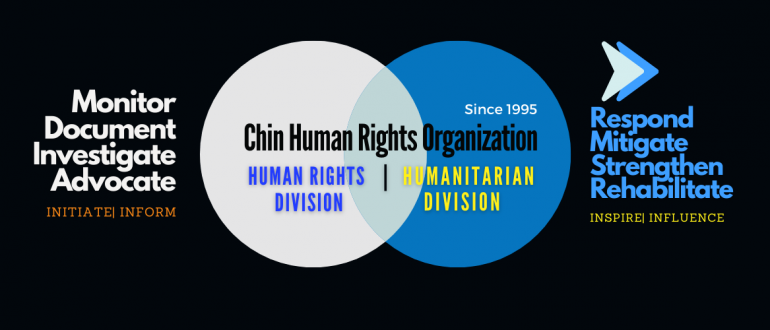In order to meet changing needs & adapt to new operating and security environment following the February 2021 military coup, CHRO operations structure has been reorganized to reflect current situation and realities. Accordingly, CHRO has been restructured into two primary Divisions: Human Rights Division & Humanitarian Division to meet the dual challenges of human rights and humanitarian nature faced by the Chin people in northwest Myanmar.
The decision to expand our programming work to include humanitarian assistance is motivated by the enormity of the humanitarian challenges in the post-coup situation in which a fifth of the population has been displaced as a direct consequence of military expansion and escalating levels of conflicts and related human rights abuses in Chin State and northwest Myanmar. The lack of existing capacity and well-established organizations ready to respond to the fast-growing humanitarian crisis make it necessary for us to step in and fill the vacuum. As a well established organization with a track record of responding to the crises in Chin State over the past nearly three decades, CHRO is naturally well-positioned to take on the challenge. In the meantime, CHRO is committed to building the capacity of local actors and naturing local CSOs and CBOs partners in order to ensure continuity and sustainability with regards to humanitarian efforts in the long run.
The Human Rights Division
Human Rights Division is composed of two thematic programs under the previous structure: Human Rights Documentation Program and Human Rights Education & Freedom of Religion or Belief Program. The Division has two program units, each headed by a manager: Documentation & Accountability Unit and Protection Unit.

Documentation & Accountability Unit: Documentation and Accountability Unit is headed by a Manager (Program Director for HRE & FoRB under previous structure) and is responsible for coordinating all documentation work and data management, in coordination with Manager of Protection Unit (Program Director) and the Advocacy and Research Coordinator. The Unit collects, stores and maintains data and information relating to human rights, and manages field staff working on documentation and data collections across all human rights projects. The Unit works on investigating and developing case files related to serious crimes in order to collect admissible evidence of serious human rights abuses to advance accountability for violations of IHRL/IHL/ICL.
Protection Unit: Protection Unit is headed by a Manager (Program Director for Human Rights Documentation under previous structure) and is responsible for managing protection issues and providing services, including physical protection for vulnerable persons and human rights defenders at risk, shelter, financial and medical support programs. The unit works in coordination with Documentation and Accountability Unit in the collection and management of data and information from the field.
The Humanitarian Division
Humanitarian Division is composed of two thematic programs under the previous structure: Peace, Development & Democratization Program and Indigenous Peoples Development Program.
The Division has two program units headed by each program director: Livelihood, Food Security and Emergency Response Unit and Health, Education & Community Liaison Unit.
Livelihood, Food Security and Emergency Response Unit is responsible for mobilizing the delivery of emergency humanitarian aid, managing livelihood and food security initiatives for conflict-affected communities. The Head of Unit works in close coordination and complementary with the Health, Education & Community Liaison Unit
Health, Education & Community Liaison Unit is responsible for mobilizing the delivery of health and education support programs for conflict-affected communities. The Unit also has the primary role of liaising and communicating/interacting with community structures, local administrative bodies and committees.

THEMATIC PROGRAMS (PRE-COUP)
CHRO’s activities are centered on four principal program areas. Each of our programs is headed by a Program Director, who manages and oversees projects and activities under that particular program. The four programs are as follows;
- Human Rights Documentation Program
- Human Rights Education and Freedom of Religion or Belief Program
- Indigenous Peoples Development Program
- Peace, Development and Democratization Program
PROGRAM DESCRIPTIONS
HUMAN RIGHTS DOCUMENTATION PROGRAM
Human rights documentation is at the heart of CHRO’s work since our very inception in 1995. Documenting human rights situation in Burma, especially under the previous military junta, entails great risks for personnel working in the frontline to collect information on the ground. Under the extremely hostile environment, CHRO field personnel clandestinely monitor and document human rights situation in western Burma. Information and data collected from the ground are then verified, collated, published and disseminated to the outside world to inform the international community about the situation facing the Chin people. CHRO documentations serve as the primary source of information about the situation of Chin people for the international community, as well as, provided the principal basis for our advocacy efforts for the protection and promotion of human rights in Burma for the past 25 years.
HUMAN RIGHTS EDUCATION AND FREEDOM OF RELIGION OR BELIEF PROGRAM
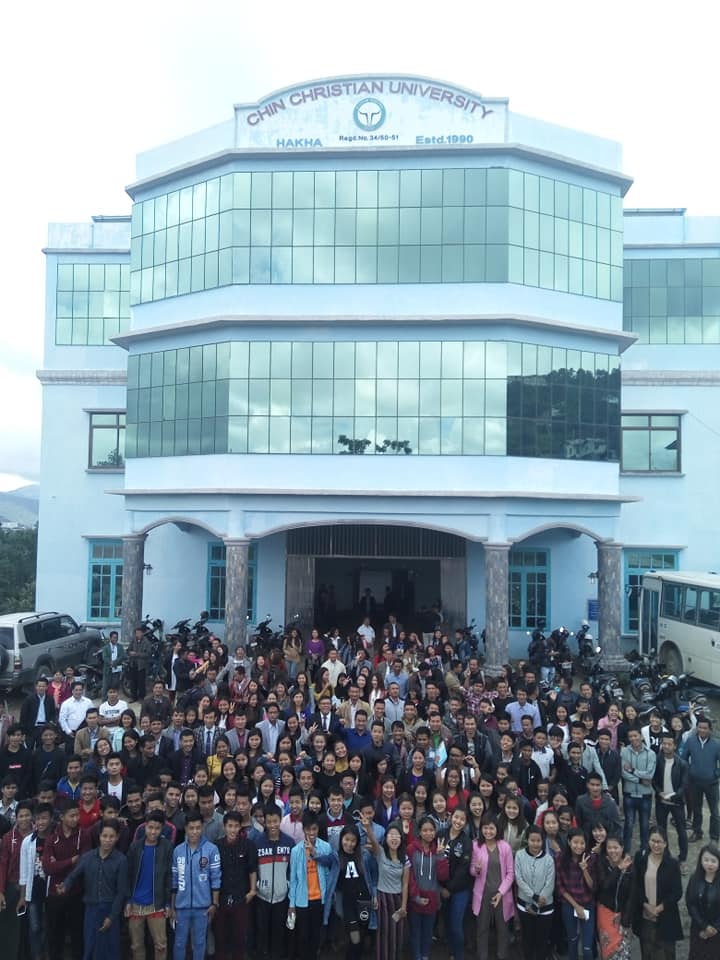
CHRO’s approach to human rights education is two-folds: teaching of formal human rights education at learning institutions on the one hand and grassroots human rights awareness programs through short-term training, on another. In partnership with the Chin Christian University (CCU), the privately-run higher learning institution based in Hakha, CHRO has been running a human rights course as part of the official curricula for the last four academic year. Under a formal Memorandum of Understanding (MoU) with CCU, undergraduate students from different academic fields are taught a human rights course, which includes topics ranging from basic human rights, freedom of religion or belief, business and human rights to international human rights standards and mechanisms, as well as human rights advocacy and their practical application in local and international contexts using specific case studies and examples. CHRO is working to expand the teaching program to other educational institutions in Chin State.
On the other hand, CHRO provides short term tailored human rights training for various groups and communities in villages and rural areas affected by decades of human rights abuses. The rationale being that when people are equipped with the awareness and knowledge of their rights, the are more likely to be able to effectively defend their own rights.
One of the primary human rights issues facing the Chin people for generations have been violations of the right to freedom of religion amounting to persecution under the military regime. Over 90 percent of the Chin people are Christians and have faced discrimination on the basis of their religious identity in a country that is predominantly Buddhist. Today, under a new semi-democratic civilian government, the Chin people still face discriminatory policies and institutional practices that prevent them from enjoying religious freedom. The majority of Christians in Chin State and Chin people living in Rakhine State, Magwe and Sagaing Regions face severe restrictions on constructing or renovating places of religious worship, legal ownership of religious land and properties and proselytizing of Christianity.
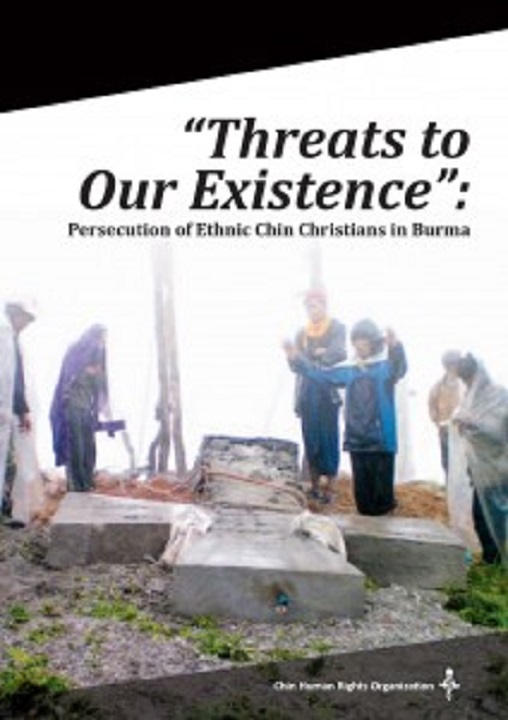
IAccording to a CHRO September report, Christian communities in Chin State were still unable to own land registered for religious purposes; instead they used private or individual names to register the land and build houses of worship. A local official said high-ranking government officials in Chin State chose to conduct official visits on Sundays to disrupt church services.
International Religious Freedom Report for 2019
United States Department of State • Bureau of Democracy, Human Rights, and Labor
INDIGENOUS PEOPLES DEVELOPMENT PROGRAM
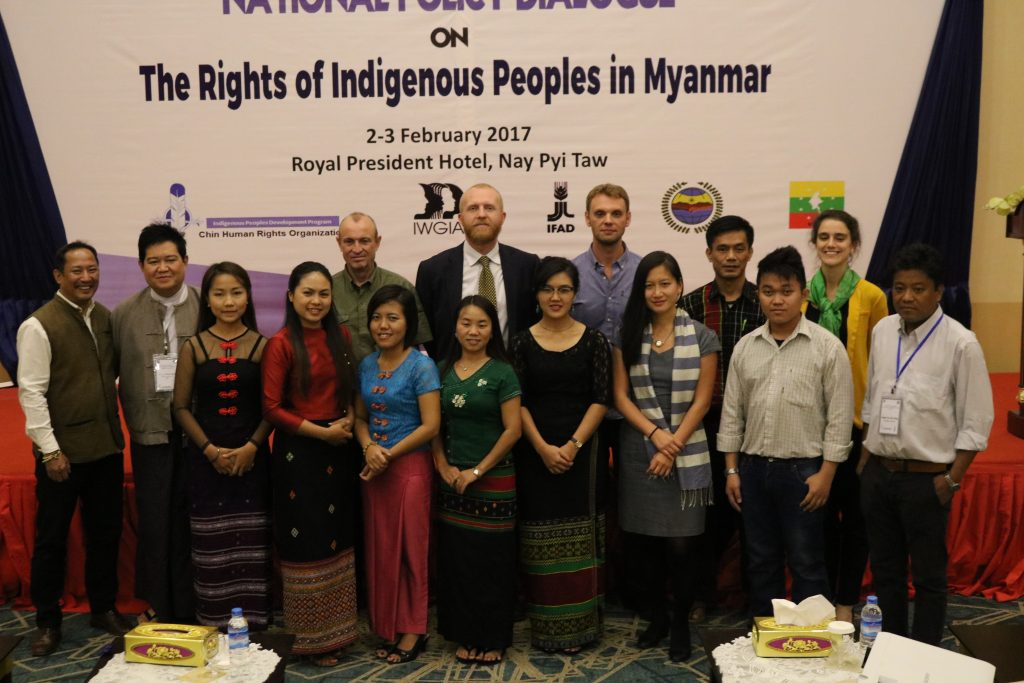
The internationally accepted term “Indigenous Peoples” in Burma context pertains to ‘ethnic issues.’ Since the very beginning, CHRO has participated and engaged in the international processes relating to indigenous peoples at the United Nations in Geneva. From the time of the UN Working Group on Indigenous Peoples under the Sub-Commission on Human Rights, CHRO has actively participated in the larger indigenous peoples movement and was a part of the deliberation process for the UN Declaration on the Rights of Indigenous Peoples (UNDRIP). As an active member of the Asia Indigenous Peoples’ Pact (AIPP), CHRO now regularly participates at the Permanent Forum on Indigenous Issues in New York. In 2016, CHRO started establishing a working relationship with the newly-formed Myanmar Ministry of Ethnic Affairs in conducting capacity-building for senior members of the Ministry and leaders of indigenous human rights groups from the different ethnic states in Myanmar. In 2017, CHRO co-organized with the Ministry of Ethnic Affairs the country’s first ever “Policy Dialogue on the Rights of Indigenous Peoples in Myanmar,” which was participated by a range of national and international stakeholders, including grassroots indigenous representatives and the UN Country Team. CHRO also helped the Ministry of Ethnic Affairs in drafting its by-laws by conducting two rounds of multi-stakeholders’ consultations, which was hailed as the first ever open multi-stakeholders’ consultation process in developing an administrative law in Myanmar. CHRO also works in close partnership with the Myanmar Indigenous Peoples’ Network, a 28-member coalition, which it co-founded in 2014 in order to collectively advance the rights of Myanmar’s ethnic peoples from across the country. As a leading organization on indigenous peoples’ rights in Myanmar, CHRO also works on Climate Change and environmental issues, as well as, land, natural resources and territorial issues as they relate to the Free, Prior and Informed Consent (FPIC).
PEACE, DEVELOPMENT & DEMOCRATIZATION PROGRAM
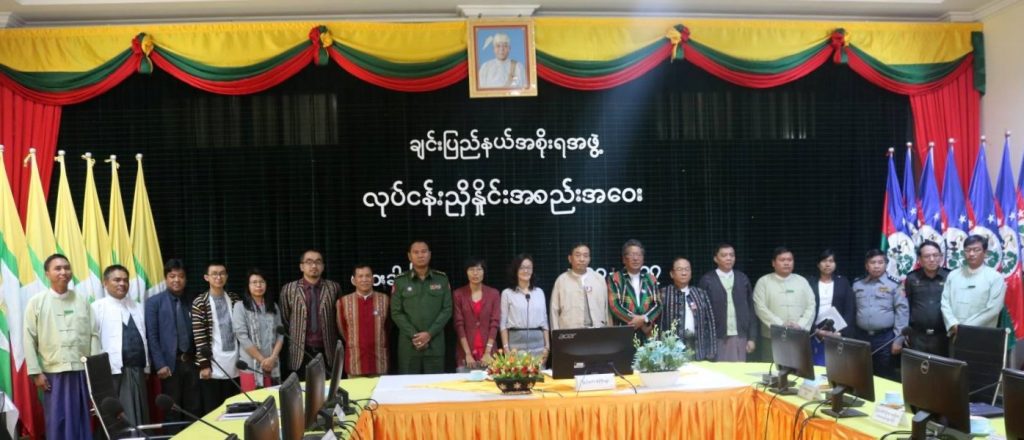
Peace, development and democratization are all inter-related issues in Myanmar today. These issues are becoming even more relevant for the Chin people after the signing of the bilateral ceasefire between the Chin armed group Chin National Front (CNF) and the Myanmar government in 2012, which saw the beginning of a new environment of peace and relative calm after 24 years of armed conflicts in Chin State. Because of long-term neglect and discrimination by successive governments, Chin State has lagged far behind in all aspects of development, including basic infrastructures such as road and transportation systems, education and healthcare facilities, becoming the poorest of all regions of the country within a span of less than three decades. By 2014, 73 percent of the population lived under poverty line, which is three times higher than the national average, according to the United Nations. Systematic human rights abuses such as forced labor and violations of religious freedom against the largely Christian population has led to the exodus of over a fourth of the total population out of Chin State since 1988. But the new environment under a semi-civilian democratic government has also paved a way for new development and economic opportunities in the State. At the same time, new opportunities for foreign investments have created a situation in which new human rights concerns have emerged due to the lack of effective safeguards and issues of access to justice and remedial mechanisms and measures. A human rights approach is therefore needed to ensure that all developments and other measures designed to mitigate poverty in Chin State meet the minimum standards of fairness. Cross-cutting with these issues is the rights of indigenous peoples and the principle of Free, Prior and Informed Consent (FPIC), which is at the center of CHRO’s work around indigenous issues under the Indigenous Peoples Development Program.
Based in the state capital Hakha, and with the financial support of the multi-donor group Livelihood and Food Security Trust Fund (LIFT Fund) and in collaboration with the International Organization for Migration (IOM), CHRO is currently working on a project to address labor and migration issues under the Peace, Development and Democratization Program, which is being implemented in all of the nine townships in Chin State.


